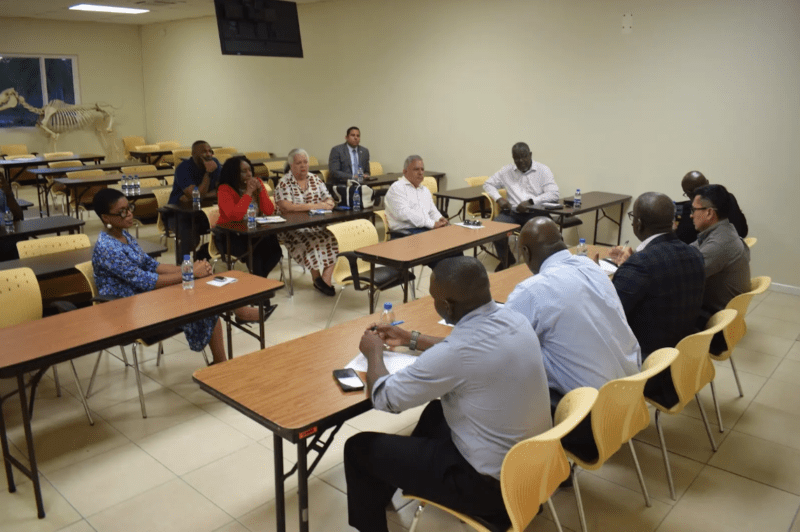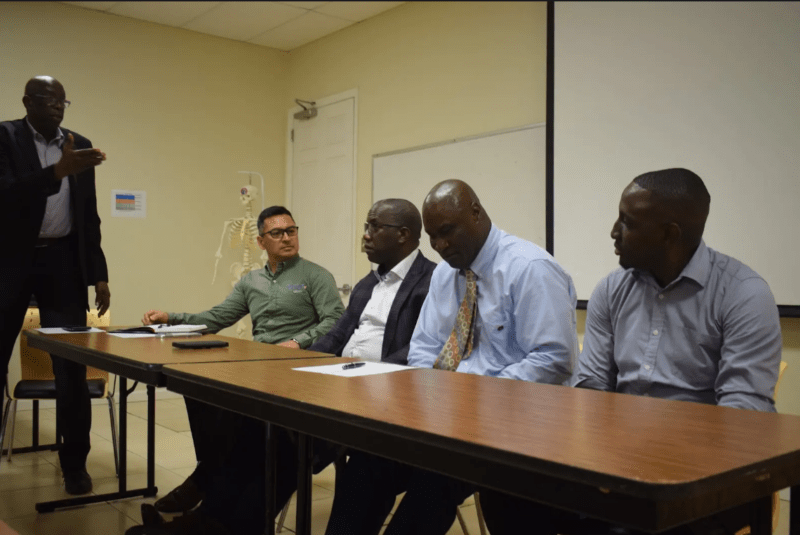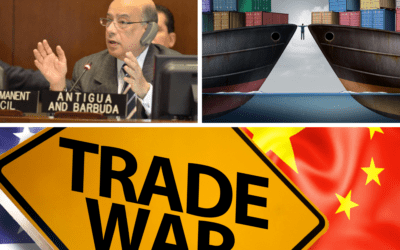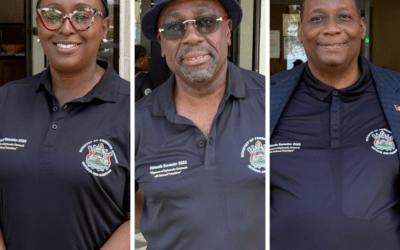You can now listen to Antigua News articles!

President of the Antigua and Barbuda Chamber of Commerce, Mario Colindres was pleased to host the regional trade experts and business leaders who are sounding the alarm over rising shipping costs and looming economic disruption, as international sanctions threaten to strain supply chains and trade routes across Latin America and the Caribbean.
Gathering at the American University of Antigua on Thursday evening 10th April 2025, representatives from the shipping industry, customs, consumer affairs, and diplomatic corps from surrounding countries addressed the growing pressures on small island states like Antigua and Barbuda. The session, convened by the Executive Director of the Chamber of Commerce, Martin Cave focused on the fallout from unilateral international sanctions by the United States government, and the urgent need to consider diversify of trade relationships as a viable option.
Among the issues raised were again the increasing cost of freight, the implications of new carbon taxes from the International Maritime Organization (IMO), and the risks associated with importing goods from less familiar markets.
David Martin Deputy Comptroller of Operations at the Customs and Excise Division said that while tariffs remain steady, shipping companies would be independently raising prices—passing increased operational expenses onto importers and, ultimately, consumers.
Tamara Lowe-James, Island Manager for Tropical Shipping, cited higher production costs for shipping agencies as the main reason behind elevated shipping charges, even though customs tariffs have not changed.
Port Manager Darwin Telemaque painted a bleak picture of the road ahead. “Ports are becoming as crucial as the power grid and data centers,” he said, stressing the need to rethink port efficiency and productivity to cushion consumers from skyrocketing costs. “We should take a hard look at the ecosystem and try to find ways to mitigate the expenses.”
If the U.S. implements measures against Chinese-built ships, “it’ll be worse than the COVID-19 pandemic, worse than a hurricane,” he warned, calling for urgent reforms to avoid economic catastrophe.
Orrin Steele, from the Prices and Consumer Affairs Division, said the cascading impact of sanctions could lead to unaffordable prices for basic goods. “I don’t know what’s going to happen in the next six months based on all those charges that may come. We are a small island, and we don’t have certain powers to curtail these things.”

However, sourcing goods from other markets may be challenging as well, he said, adding that sourcing alternatives from unfamiliar markets poses its own risks, including poor product standards and inadequate labeling.
While Steele expressed concern about the quality of goods from new trading partners, others argued that Antigua and Barbuda already imports many products from Latin America. The discussion soon turned to the need to tap into the Dominican Republic (DR) as a reliable and cost-effective supplier.
Telemaque was concerned that the current Common External Tariff (CET) had unintended consequences presenting a barrier to trade with regional producers like the DR. “Protectionism,” he said, is “starving us” from benefiting from the Dominican Republic, one of the biggest food producers in the region. “We are the best-connected island to Santo Domingo outside of Jamaica.”
There were calls for Antigua and Barbuda to explore becoming a regional logistics hub and for the government to petition CARICOM for tariff exemptions on essential goods.
“Our allies that kept us safe are not interested in doing that anymore,” Telemaque stated, suggesting that Caribbean nations must now look inward for solutions.
Luis Enrique Reynon, The First Secretary Embassy to the Dominican Embassy echoed the sentiment. He called for stronger economic ties between the DR and CARICOM countries. “It is important that governments sit together and make decisions that benefit the Caribbean as one economic bloc,” he said, highlighting the DR’s strategic position between the Caribbean and South America.
The DR is well placed between the Caribbean and South America but there is a disconnection between CARICOM countries and DR, he said.
Kevin Rogers, Chief Operating Officer at Go To Enterprises added that while the company brings in some goods through the DR, most shipments still pass through South Florida. “Everything goes through Miami” which means that any sanctions would greatly impact its business.
The consensus at the forum was clear: the Caribbean must act swiftly and collaboratively to insulate its economies from the knock-on effects of sanctions and reimagine trade to ensure stability and sustainability for the future.
“The government can look at writing to CARICOM for exemptions on certain products,” to reduce cost. We don’t really manufacture anything here and so, we are at the mercy of suppliers overseas most times,” Steele said.
It will take a collaborative effort to keep prices on consumers down and Latin America and Caribbean economies stable, everyone agreed.




























Let’s stop talking and be about it….. Yes, there will be challenges but we are a resilient people who have always found solutions to problems. Team work makes the dream work. Let’s stop with the crab in a barrel mentality and collaborate so everybody in the Caribbean and Latin America benefit. Let’s stop putting our survival at the whim of those who view us as no more than shit hole countries. Let’s show them how much more we are. We are nation strong and collaboratively we can be Caribbean/ Latino strong. And the idea of having Antigua as the main port sounds good to me. Go forth and conquer…..
Ride that trump wave..everything Trump js doing is sick. He hates people. Some of this policies makes no sense clearly it is a way to hurt people.
I can’t disagree. It’s America first so of course others will no longer be benefitting like how they were previously.
So basically, we’re stuck paying double for food because of sanctions we didn’t even cause? This is madness. Our leaders need to stop pretending like we’re immune to what’s happening globally. Prices are going up, and we’re still playing politics. The writing is on the wall. If we don’t diversify trade soon, the next crisis will break us.
Shipping issues are global. Even the U.S. is struggling. Antigua alone can’t fix this. It’s easy to criticize and blame, but let’s not forget the government’s been pushing for logistics reform. These things take time. Everyone wants to shift to the DR until bad quality goods show up with no proper labeling. Be careful what you wish for.
This forum was a wake-up call. Time to stop pointing fingers and start drafting real regional trade policy. I think it’s time for CARICOM members to prioritize trade over politics. We need each other more than ever.
Can someone please tell me why we still have high tariffs on essential goods from the region? We’re hurting ourselves.
All I know is my grocery bill keeps going up and no one has answers. Tired of these meetings with no real results. Talk, talk, talk. Meanwhile we paying $10 for a 1 pound bag of rice.
This is beyond all the people we see sitting there. It’s not to the government doing either